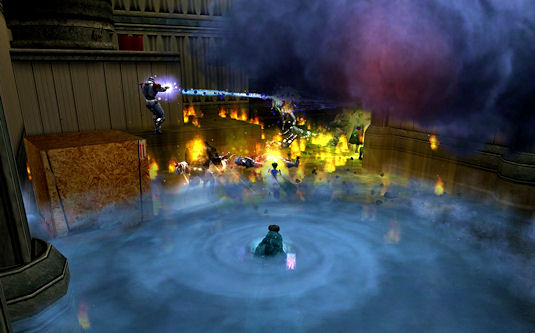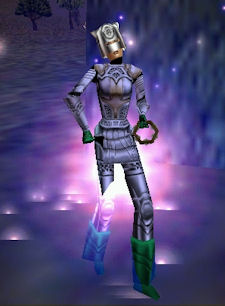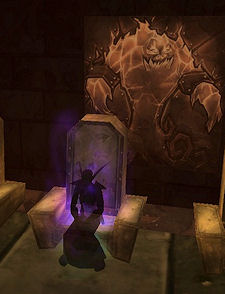
Here’s how to tell whether you’re an old-school MMORPG player: Tell me what character archetypes make up the holy trinity, that fabled core combination of classes that makes or breaks a dungeon group.
If you said tank, healer, and damage, you’re adorable and I love having you as a fellow player and you’re half right, but no. That trinity, what I’ve been calling the “modern” trinity for clarity’s sake, became popular only following World of Warcraft’s launch. WoW eliminated a pure crowd-control class from its roster and divided weak crowd control skills among the healing, tanking, and damaging classes.
Prior to 2004, a different role loomed larger than the damage-dealer in players’ minds. The “classic” trinity is far older than MMOs, but games like EverQuest and Dark Age of Camelot cemented the tank, healer, and mezzer trio in history, mezzer being short for Mesmerize, a critical crowd control skill in EverQuest. “Deeps” weren’t holy or essential back then; they were a given. You assumed your other three spots would be filled by damage-dealers, hybrids, pullers, mana batteries, buffers, or back-up healers, but in the olden days, the first three spots were invariably taken up by a plate tank, a cleric, and an enchanter, especially in higher-level content.
In that context, I suppose the tank/healer/DPS trinity isn’t really a holy anything. It’s a no-brainer description of the only possible roles anyone could hold in your group in a game where those are the only roles anyway. Tanks, healers, and mezzers were considered “holy” in EverQuest-era games because there were so many other non-critical group roles to be had.
Pedantic history lesson aside, I think there’s so much to learn from this trinity shift. The important bit isn’t who called what when; the important bit is that we not forget how crowd-control used to be an anchor of MMO combat gameplay and why.
 The AI in early MMOs was pretty terrible. Classic EverQuest’s idea of challenging gameplay was tough, hard-hitting mobs that attacked in ever-greater numbers. There wasn’t really anything more complicated to a basic fight, so a good group needed an enchanter to mitigate the incoming damage by reducing the number of enemies hitting you at any given time and debuffing the rest. Healers and tanks couldn’t keep up otherwise. It was simply a numbers game.
The AI in early MMOs was pretty terrible. Classic EverQuest’s idea of challenging gameplay was tough, hard-hitting mobs that attacked in ever-greater numbers. There wasn’t really anything more complicated to a basic fight, so a good group needed an enchanter to mitigate the incoming damage by reducing the number of enemies hitting you at any given time and debuffing the rest. Healers and tanks couldn’t keep up otherwise. It was simply a numbers game.
The problem was that leveling an enchanter in EQ was excruciating. It was a terribly solo-unfriendly game for many of the classes, especially those whose primary role was to hold mobs in place and not do damage. Signing up for the enchanter role meant a lifetime of forced grouping, even moreso than the cleric, who could actually solo undead with relative ease.
Blizzard did not want forced grouping across the entirety of World of Warcraft. Oh sure, in those early days, there were plenty of group quests, and it isn’t as though anyone was soloing 5-man (or 10-man!) Scholomance, but the primary leveling gameplay was intended to be soloable. Every single class, even tanks and healers, had a damage spec to get it through to endgame, and while crowd-control itself was still scattered among the classes, it ceased to be a role, and more importantly, it ceased to be a core mechanic around which encounters were designed. In fact, Blizzard plans to delete even more CC from WoW in the Warlords of Draenor expansion.
Why didn’t Blizzard just include a crowd-control class with a damage off-spec for soloing? It certainly could have. But I think MMO AI had evolved such that it was just unnecessary in the game Blizz wanted to make. I have fond memories of my guildies crowd-controlling their way through vanilla dungeons with polymorphs and roots and banishes, but for the most part, the intelligence of the AI made encounters much more interesting. WoW wasn’t just throwing more and more mobs at you and forcing you to disable them; the scripting allowed for special mechanics to ramp up the challenge.
 It all makes sense, but the fact remains that crowd-control is actually fun to play. Anyone who ever played a provoker in Ultima Online, a bard in EQ, or a controller in City of Heroes knows the joy of dominating, debuffing, and utterly dismantling groups of foes. It’s often more fun than killing them! As the trinity has been redefined so dramatically that only a tiny fraction of the MMO-playing population even remembers what the original trinity was, we’ve simultaneously lost an incredibly fun gameplay mechanic that’s been reduced to novelty spells in far, far too many MMOs. And many players hate the idea of forced grouping and a holy trinity of special in-demand classes so much (with good reason!) that they really don’t care that an entire combat playstyle and the mechanics and fun that go along with it are essentially being written out of our genre, game by game.
It all makes sense, but the fact remains that crowd-control is actually fun to play. Anyone who ever played a provoker in Ultima Online, a bard in EQ, or a controller in City of Heroes knows the joy of dominating, debuffing, and utterly dismantling groups of foes. It’s often more fun than killing them! As the trinity has been redefined so dramatically that only a tiny fraction of the MMO-playing population even remembers what the original trinity was, we’ve simultaneously lost an incredibly fun gameplay mechanic that’s been reduced to novelty spells in far, far too many MMOs. And many players hate the idea of forced grouping and a holy trinity of special in-demand classes so much (with good reason!) that they really don’t care that an entire combat playstyle and the mechanics and fun that go along with it are essentially being written out of our genre, game by game.
That’s a short-sighted position for players and studios alike; worse, crowd-controllers aren’t the only archetypes at risk. Consider that I’ve allowed WoW, a game that came out nearly a decade ago, to define the “modern” trinity. If I instead highlighted the industry’s most recent blockbuster, Guild Wars 2, I’d have to redefine the trinity yet again: dps, dps, dps. Guild Wars 2 has deleted tanks, healers, and support classes in one brushstroke. You can throw on a shield and select a tanking spec, sure, but it’s ineffective throughout the majority of the game, even endgame, without any way to corral aggro. You can heal yourself, but if you enjoy healing your party, you’re stuck casting ground-targeted spells that don’t feel much like traditional support at all.
Does Guild Wars 2 need tanks and healers and support? Not strictly. It was intentionally designed to be playable without them (though there’s certainly justified community debate over whether it does so well in party situations). But studios take a risk when they make character-level gameplay too samey. Players want to solo to the cap, sure, but they also don’t want to play nothing but deeps. Playing all damage, all the time gets boring and reduces the longevity and complexity of a game as surely as poor AI ever did (just ask folks who played WoW during the WotlK “AoE everything” era). Healing and tanking and crowd-control roles weren’t the real problem; the real problem was a one-spec group-or-die design, so limiting player roles simply reduced the depth and variety of gameplay, which is bad all around.
Even deeps lose out when group combat and class gameplay homogenizes.
Right or wrong, I still think GW2 at least did a bunch of things differently. The solo play got more interesting but the group play became a lot of zerging, cooldown spamming and so on. Comparing that to older games, even though Lineage 2 had a lot of faults I still enjoyed playing the Orc caster classes. The Warcryer had group buffs, group HoTs and DoTs while the Overlord had clan/alliance buffs, AoE CC and debuffs. What’s more interesting that both of them had passives for all three types of armour and Soulcry, a mana draining skill which increased your physical damage so you could find a playstyle which suited you best.
Personally when soloing I would use light armour which was a combination of medium protection and decent mana regen, fist weapons, Soulcry and self-buffing, while in group I’d swap to a robe and cast CC, buffs and debuffs. Needless to say it was still pretty difficult to solo but I loved the playstyle. It wasn’t easy but you got to do a ton of different stuff as opposed to just killing mobs and drinking potions. Although you could say the CC spread out across different classes requires better coordination, that’s one thing I really liked about dungeons in SWTOR.
I miss my Dual Pistols/Kin for good reason, Much Like i miss by ninja and Dark knights in FF XI. Debuffing and then buffing my self or the party by doing the debuffs is a very fun mechanic especially mixed with crowd control!
I personally miss the early trinity that you speak of. I was huge in to my EQ shaman and Enchanters. A heal class that specialized mostly in buffs and or debuffs was just fun to me. Ya my heals never topped the charts but I took pride in knowing that the group as a while was better with my buffs. Same with my mezzer. It was a skilled trait of timing and attention to detail that I felt most players lacked to play a good CC. Especially considering the days before add ons and built in timers.
I for one do not care for games that go against the trinity legacy or modern. GW2 and Champions Online being one of the two that bothered me most. In the death of CoX I had high hopes for CO but after the fun character creations, the costume contests, and the rediculous pvp, it was just a giant deeps fest. A game where there is no value in player skill and specialization will always be ignored by players like myself. I enjoy knowing my skills are needed and further more it gives you a job to perfect on and take pride in. When everyone is self healing, deeping, and bouncing aggro all over the room it just becomes a snooze fest for me. What keeps me from tagging the boss once and then just afk while i surf the web? I think ESO and RIFT did it best. Dont kill the trinity, just open it up and available to all. I think there lies an idea with endless possibilities that we will hopefully see more of in the future.
I just want to give a shout out to the puller. It was such an art to be a good puller, and they were not always easy to come by. If you played a monk back in the day, I love you forever!
Haha, right? Everyone loved a good monk. 😀 We had a rogue puller sometimes too, and I pulled lots on my bard. Got good at it eventually! Thankless job!